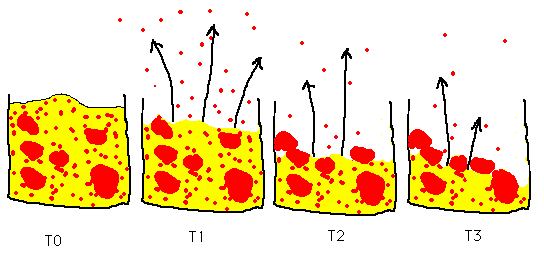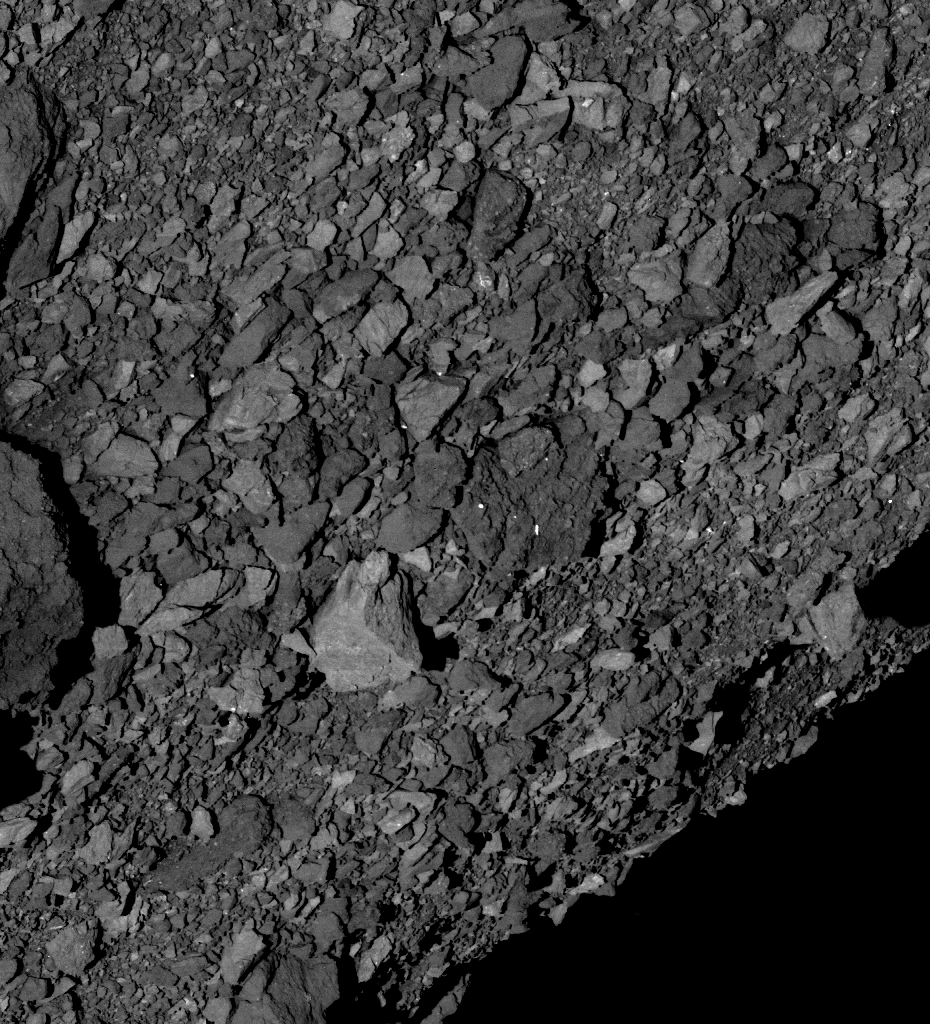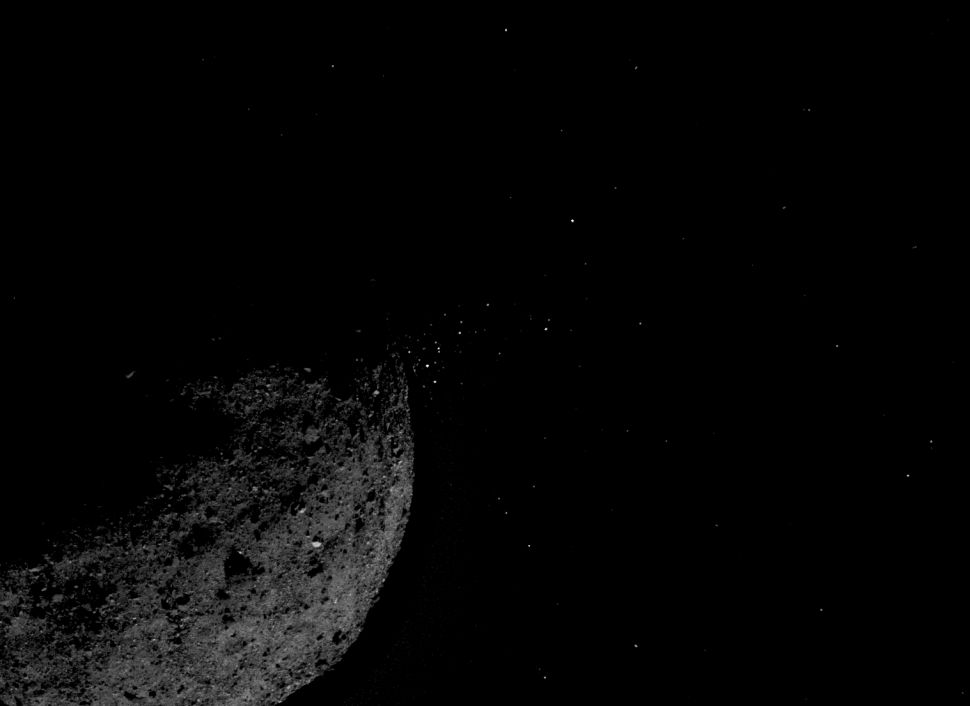It looks like you're using an Ad Blocker.
Please white-list or disable AboveTopSecret.com in your ad-blocking tool.
Thank you.
Some features of ATS will be disabled while you continue to use an ad-blocker.
15
share:
NASA's OSIRIS-REx spacecraft rendezvoused with asteroid Bennu last December and since then it's been mapping the asteroid's surface in preparation for
a sample acquisition from the asteroid to be returned to Earth , during the course of the mapping NASA has discovered Bennu is ejecting material from
its surface with as many as eleven events identified so far.
Not Earth shattering but quite interesting I think.
The ejection events involve bits of space rock ranging from a few centimeters to up to tens of centimeters in diameter, Lauretta said. And the particles' velocities vary widely, too. Some move at up to 7 mph (11 km/h), fast enough to escape Bennu's weak gravity and cruise into interplanetary space. And other pieces merely mosey out, becoming trapped in orbit around Bennu for a spell and then falling back down onto the asteroid's surface.
"Basically, it looks like Bennu has a continuous population of particles raining down on it from discrete ejection events across its surface," Lauretta said. "This is incredibly exciting."
The team doesn't know what's spurring the ejection events. The ejections have been observed around the time of Bennu's closest passage to the sun during the asteroid's elliptical orbit, which occurred this year on Jan. 10. So, solar heating of the asteroid's surface and near-subsurface may be the main driver. But that's just speculation at the moment, Lauretta stressed.
www.space.com...
Not Earth shattering but quite interesting I think.
edit on 21-3-2019 by gortex because: (no reason given)
a reply to: gortex
They've also noted that its rate of rotation is speeding up -- by about an estimated one sec of rotation per century, which doesn't sound like much, but the article I linked below claims it is significant. The faster rotation rate could be explained by the loss of material described in your (the OP's) link.
The Asteroid Bennu Keeps Spinning Faster and Scientists Aren't Sure Why
They've also noted that its rate of rotation is speeding up -- by about an estimated one sec of rotation per century, which doesn't sound like much, but the article I linked below claims it is significant. The faster rotation rate could be explained by the loss of material described in your (the OP's) link.
The Asteroid Bennu Keeps Spinning Faster and Scientists Aren't Sure Why
edit on 3/21/2019 by Soylent Green Is People because: (no reason given)
I believe I read somewhere, that the astrophysics crowd say it has to do with an unusual center of gravity, because of the asteroid's shape, combined
with a high spin rate.
Loose pieces tend to roll at a speed greater than escape velocity.
It certainly appears to be unusual, although sample size is small.
Loose pieces tend to roll at a speed greater than escape velocity.
It certainly appears to be unusual, although sample size is small.
a reply to: gortex
If you could take a crap in space, on an angle, wouldn't that contribute to your spin? lol If the ejecta in some cases was coming off at some acute angle (1-20 degrees) from parallel to the surface, that would cause a spin increase through simple action and reaction.
Cheers - Dave
If you could take a crap in space, on an angle, wouldn't that contribute to your spin? lol If the ejecta in some cases was coming off at some acute angle (1-20 degrees) from parallel to the surface, that would cause a spin increase through simple action and reaction.
Cheers - Dave
a reply to: gortex
I say we do the safe thing. Get back on board, lift off, and nuke the thing from orbit! It is the only way to be sure.
Maybe it is like Ceres where water vapor is reacting with pop-rocks causing it to spittle.
I am glad we don't everything yet! Space would get really boring (another asteroid... been there, done that!)
I say we do the safe thing. Get back on board, lift off, and nuke the thing from orbit! It is the only way to be sure.
Maybe it is like Ceres where water vapor is reacting with pop-rocks causing it to spittle.
I am glad we don't everything yet! Space would get really boring (another asteroid... been there, done that!)
Thanks for the thread, I've noticed this news from NASA and various space pages, and wondered what ATS people think about it.
The Electric Universe people will of course be all over it claiming it's some electric activity causing this.
If the ejection events aren't happening simply due to the asteroid spinning faster and faster, what else could it be?
Looking at another recent image, showing boulder-strewn surface, it reminds me a lot of the so-called rubble mantle that comets have.

Could Bennu be a spent comet nucleus that still shows a bit of outgassing?
Closeup of Bennu:

I'd say it's quite asteroid-shattering.
The Electric Universe people will of course be all over it claiming it's some electric activity causing this.
If the ejection events aren't happening simply due to the asteroid spinning faster and faster, what else could it be?
Looking at another recent image, showing boulder-strewn surface, it reminds me a lot of the so-called rubble mantle that comets have.

Could Bennu be a spent comet nucleus that still shows a bit of outgassing?
Closeup of Bennu:

originally posted by: gortex
Not Earth shattering but quite interesting I think.
I'd say it's quite asteroid-shattering.
edit on 21-3-2019 by wildespace because: (no reason given)
a reply to: wildespace
Some asteroids are described as "rubble piles" or "gravel banks"
Loosely conglomerate group of rock/ice held together by gravity
Spin it rapidly enough can cause bits of rock to fly off - the escape velocity of a body as small as Bennu is so low
that does not take lot of energy to fly off into space
Could Bennu be a spent comet nucleus that still shows a bit of outgassing?
Some asteroids are described as "rubble piles" or "gravel banks"
Loosely conglomerate group of rock/ice held together by gravity
Spin it rapidly enough can cause bits of rock to fly off - the escape velocity of a body as small as Bennu is so low
that does not take lot of energy to fly off into space
originally posted by: Phage
a reply to: wildespace
Any indication of scale?
(I'm lazy. Been trimming hedge all day.)
The large, light-colored boulder just below the center of the image is about 7.4 meters.
www.planetary.org...
Though we aren't sure if outgassing is involved with Bennu or not, it wouldn't have to be the remnants of a comet to have outgassing. Asteroids can also have frozen material, and the distinction between comets and asteroids can be blurry.
originally posted by: wildespace
Could Bennu be a spent comet nucleus that still shows a bit of outgassing?
Comet or Asteroid?
In the past, the Solar System seemed to be a tidy and well-organised place, with many families of objects neatly grouped together in different and distinct categories. There were planets and moons, comets and asteroids. But the nature of scientific discovery is the constant replacement of old knowledge with new, that most of the time leads to a major re-thinking and change of our established view of the Cosmos...
Further blurring the dividing line between asteroids and comets, a team of astronomers led by Michael Küppers, working at the European Space Agency’s Space Astronomy Centre near Madrid, Spain, just published its study on the results of its observations of Ceres with ESA’s Herschel Space Observatory...
What intrigues astronomers is the fact that this sublimation process of localised water ice on Ceres is common to comets as well. When comets lie far from the Sun beyond the Solar System’s frost line, they are nothing more than solid, dry objects, not unlike asteroids in appearance. When their orbits bring them adequately close to the Sun, solar radiation causes the ices that are hidden underground to heat up and begin to outgas, creating the spectacular views of bright comas and long, stretched tails of sublimation gas that comets are best known for. “The lines are becoming more and more blurred between comets and asteroids,” said Seungwon Lee of NASA’s Jet Propulsion Laboratory, who aided the team on their computer simulation studies.
originally posted by: firerescue
a reply to: wildespace
Could Bennu be a spent comet nucleus that still shows a bit of outgassing?
Some asteroids are described as "rubble piles" or "gravel banks"
Loosely conglomerate group of rock/ice held together by gravity
And yet Bennu's (and Ryugu's) extremely rubbly surfaces came as a surprise to the scientists. They seem to have been expecting to see a smoother, more solid surface.
originally posted by: Phage
a reply to: wildespace
Black comets,
A husk of their former glory.
Gliding forever around the sun.
I fixed your Haiku for you, Phage
Black comets gliding
Husks of their former glory
Ever 'round the sun.
a reply to: Soylent Green Is People
You're such a traditionalist.
"Falling" works even better.
You're such a traditionalist.
"Falling" works even better.
edit on 3/26/2019 by Phage because: (no reason given)
new topics
-
Israel attacking Iran again.
Middle East Issues: 9 minutes ago -
Michigan school district cancels lesson on gender identity and pronouns after backlash
Education and Media: 13 minutes ago -
When an Angel gets his or her wings
Religion, Faith, And Theology: 1 hours ago -
Comparing the theology of Paul and Hebrews
Religion, Faith, And Theology: 1 hours ago -
Pentagon acknowledges secret UFO project, the Kona Blue program | Vargas Reports
Aliens and UFOs: 2 hours ago -
Boston Dynamics say Farewell to Atlas
Science & Technology: 3 hours ago -
I hate dreaming
Rant: 3 hours ago -
Man sets himself on fire outside Donald Trump trial
Mainstream News: 5 hours ago -
Biden says little kids flip him the bird all the time.
Politicians & People: 5 hours ago -
The Democrats Take Control the House - Look what happened while you were sleeping
US Political Madness: 6 hours ago
top topics
-
The Democrats Take Control the House - Look what happened while you were sleeping
US Political Madness: 6 hours ago, 16 flags -
In an Historic First, In N Out Burger Permanently Closes a Location
Mainstream News: 8 hours ago, 14 flags -
Biden says little kids flip him the bird all the time.
Politicians & People: 5 hours ago, 8 flags -
A man of the people
Medical Issues & Conspiracies: 13 hours ago, 8 flags -
Man sets himself on fire outside Donald Trump trial
Mainstream News: 5 hours ago, 7 flags -
Pentagon acknowledges secret UFO project, the Kona Blue program | Vargas Reports
Aliens and UFOs: 2 hours ago, 5 flags -
4 plans of US elites to defeat Russia
New World Order: 15 hours ago, 4 flags -
Sheetz facing racial discrimination lawsuit for considering criminal history in hiring
Social Issues and Civil Unrest: 6 hours ago, 3 flags -
Boston Dynamics say Farewell to Atlas
Science & Technology: 3 hours ago, 3 flags -
Are you ready for the return of Jesus Christ? Have you been cleansed by His blood?
Religion, Faith, And Theology: 11 hours ago, 3 flags
active topics
-
Michigan school district cancels lesson on gender identity and pronouns after backlash
Education and Media • 2 • : MetalThunder -
Candidate TRUMP Now Has Crazy Judge JUAN MERCHAN After Him - The Stormy Daniels Hush-Money Case.
Political Conspiracies • 402 • : Zanti Misfit -
The Democrats Take Control the House - Look what happened while you were sleeping
US Political Madness • 62 • : Kaiju666 -
Israel attacking Iran again.
Middle East Issues • 3 • : Dandandat3 -
Thousands Of Young Ukrainian Men Trying To Flee The Country To Avoid Conscription And The War
Other Current Events • 50 • : DBCowboy -
I hate dreaming
Rant • 6 • : Hecate666 -
Israeli Missile Strikes in Iran, Explosions in Syria + Iraq
World War Three • 102 • : DumbNut -
Man sets himself on fire outside Donald Trump trial
Mainstream News • 32 • : cherokeetroy -
Pentagon acknowledges secret UFO project, the Kona Blue program | Vargas Reports
Aliens and UFOs • 5 • : Ophiuchus1 -
-@TH3WH17ERABB17- -Q- ---TIME TO SHOW THE WORLD--- -Part- --44--
Dissecting Disinformation • 546 • : MetalThunder
15

